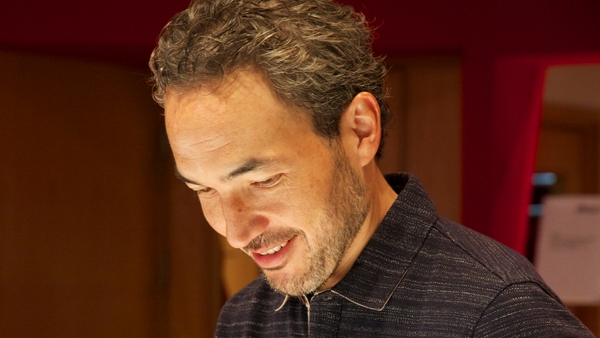 For more than a decade Steve Jablonsky has been composing riveting scores for some of Hollywood’s most bombastic blockbuster films. From the Japanese anime Steamboy (directed by legendary filmmaker Katsuhiro Otomo), to Michael Bay’s The Island and Transformers series to scoring no less than 4 feature films in 2013 alone, Jablonsky’s epic sounds have become a staple in the world of action films. Whether things are blowing up on the silver screen, the TV screen or in video games, Jablonsky is one of only a handful of go-to composers who consistently deliver diversity and complexity along with high energy themes.
For more than a decade Steve Jablonsky has been composing riveting scores for some of Hollywood’s most bombastic blockbuster films. From the Japanese anime Steamboy (directed by legendary filmmaker Katsuhiro Otomo), to Michael Bay’s The Island and Transformers series to scoring no less than 4 feature films in 2013 alone, Jablonsky’s epic sounds have become a staple in the world of action films. Whether things are blowing up on the silver screen, the TV screen or in video games, Jablonsky is one of only a handful of go-to composers who consistently deliver diversity and complexity along with high energy themes.
Originally focused on becoming a recording engineer, Jablonsky’s career as a film composer developed after assisting and collaborating with film music titans like Hans Zimmer and Harry Gregson-Williams. Before gaining recognition with his own scores, he’d written additional music for such films as Bad Boys II, Pirates of the Caribbean: The Curse of the Black Pearl, Armageddon, Pearl Harbor, Hannibal and somewhere found the time to pepper his resume with a slew of TV and video game scores. He even wrote the music for John Woo’s Hostage, which was one segment in a series of BMW short films starring Clive Owen.
We’ve admired Jablonsky’s work ever since Steamboy and I recently got to chat with Steve at length about his career for an hour and a half. Yep, you read that right, a full 90 minutes talking robots, aliens, epic soundscapes, “Bayhem”, and all things that go BOOM. Today Steve is one of the best in the business and he offered such a fascinating mix of insightful and personal experiences it was almost impossible to cut anything out…so I transcribed the entirety of our session into three parts.
Dive right into Part I of our amazing interview with Ender’s Game composer Steve Jablonsky.
————————————————————————————————————————————
– So glad to be speaking with you Steve, let’s start by talking about creating the sound for Ender’s Game. It’s a great sci-fi film but your score is just phenomenal. Aside from Steamboy and The Island I think it’s the best work you’ve ever done, or at least my favorite anyway. The score has these overpowering themes, like “Ender’s War”, that really drive the story and help the film end on such a high note – there’s that bombastic cue playing when Ender opens his eyes before the credits roll. So what was your mindset in composing and developing that theme and how it relates to the whole story?
When I began writing that theme and, well maybe more generally, the whole score itself, I wasn’t planning for it be overpowering. I didn’t have anything like that in mind as
I came into the project not actually knowing the book, I’m embarrassed to say, and the first time I sat down to watch what they had up to that point I didn’t know what the story was all about. I wasn’t sure if it would be a big sci-fi adventure or what. Then I saw the film and realized actually there’s just a handful of action scenes. It’s more about this young boy and how he’s dealing with all these crazy circumstances. So I started a bit more simple which is actually how that track starts, with a solo cello. That’s kind of what I was thinking for the score because it’s such a moody and dark film, so I wanted to keep it simple where I could.
But that piece in particular, the inspiration came from that exact moment you’re talking about, when Ender’s eyes open at the end. Originally when I first saw it there was a song, a U2 song. Now U2 is awesome, we all know that, but there was no song anywhere in the film so when I watched it and then all of a sudden “Beautiful Day” kicks in right there on the chorus I go “what the hell is this?”, it just felt so wrong and they said “well, that part there needs to be just huge, and this is the only thing we could find that works, score or song or otherwise”. So I said “alright, let me try something”. I actually started with that piece, “Ender’s War”, because I wanted a simple theme for Ender. It was something that developed over time but I wrote that big section of the theme with that final moment in mind.
So we put it there, and they were happy with it. But when I was hired they did tell me, “look we have several big, really cool looking cinematic moments, (what we call music moments) where you can do your thing”. Scenes like the spinning shot of Ender with his guns in the battle room (“Salamander Battle”), and when he’s shooting off into space to go to Command School, so I did have some opportunities to do some stuff with a big choir and a big orchestra. That was fun but for the most part I see it as a moody score with some big moments sure but it’s a story that’s kind of dark especially for some people who don’t know the book.
– I’m right there with you, I didn’t know anything about the story until the Press screening. I sat next to somebody who had just finished the book so I got sort of a crash course in what it was all about. Now the score is very moody as you say, and there’s a nice balance of the powerful beats played against the haunting and foreboding ones. The cello work is great and the choral work is pretty tense and emotional. You have quite a bit of choral work in all of your scores so how do you decide what needs a choir and what doesn’t? Also, choirs can be like an instrument that works in tune with the orchestra but you give them room to stand out, almost like solos. How do you make that choice?
Well I really just take my inspiration from watching through the film, even if it’s just a rough cut. It’s all in the feeling of a moment and I have to feel that something needs a choir. Obviously I love choir, but sometimes it
doesn’t feel right with the film or feels like too much, but as I like to include it as a flavor and use it a little differently I often find a way to put it in. I get asked to do a lot of these projects that are sort of big scale films with big topics like the end of the world *laughs* or aliens taking over, end of the human race, you know, so a choir is good for those things because it gives you that epic, Gothic, “something could go really wrong” feeling.
Actually for Ender’s Game it was an easy choice because I mentioned it just briefly in one of my early meetings as something I thought could maybe be a useful tool and everyone was like “oh yeah definitely, we definitely want choir” so that made it easy. People like yourself point out that I use it a lot and I don’t consciously go “yeah let’s use choir this time” but I just love the process of recording it because it sounds so great you know? It’s 30 or 40 people in a room who are all these top notch singers and it’s amazing to watch them work and then to be able to experiment and go “what if you try this, and you try that?”, then together you can come up with these really cool sounds. Sometimes a singer will come up with something and you’ll go “wow what did you just do?” and you build on that. It’s just a fun process but I guess all these big sci-fi movies inherently support choir so I say why not just use it. If we have the budget, and if the story is big enough to hold the choir then I tend to use it.
– You mention choir having a Gothic sound and that’s heightened by the use of the bells. There are also a lot of heavy drums used in the score as well. Now after hearing what Hans Zimmer did with Man of Steel and even Rush having a lot of percussion and drums it’s got me wondering, is that a trend right now or something you see, well, hear happening often?
Well that’s another thing we talked about putting in the film. I’m not exactly sure what tracks you’re thinking of specifically but in Ender’s Game there’s a lot of percussion in the action scenes but then there’s some drums when Ender is playing his mind games. Those were specifically put in because we talked about them from the beginning. But I actually haven’t seen Man of Steel so I don’t know what Hans did with that, I definitely will check it out.
We wanted to put drums in the place where Ender has his visions – those scenes where he sees this castle collapsing and then runs inside. There’s this big wide shot that has him walking on this very thin bridge that leads to this very strange looking thing in the middle of the room…*laughs*…it’s kind of hard to describe these things in words *laughs* but he has that vision a couple times and we see it for real at the end of the film so we specifically gave that shot a very specific drum beat and drum sound which is a combination of tribal beats and these weird noises I made on my computer. I don’t even remember how I made them, they’re kind of almost synthy but not quite, and those beats reflect the idea from the filmmakers. They wanted it to signal at the same place each time so that at the end it would pay off by saying “here’s that drum beat again, we’re actually here now. this is real, this isn’t his dream anymore”.
I’m sure if you go through it again you’ll hear that, but the other beats I just recorded some drums in my studio and I thought “these are cool sounds”. I like to record as much as I can and fresh new sounds for each project rather than go back and say “let me use the drums I used on Transformers”. Now they’re all great sounds but you get bored of them and you don’t want people to go “oh, he used the same drums he used in that other movie”, so Ender’s Game features new things that I recorded. While there wasn’t a specific discussion where the filmmakers said “we want the drums to sound like this” after I let them listen to what I’d come up with they specifically said “we really like that sound”.
So once a filmmaker tells you they really like something then you tend to put in a lot of places *laughs* because you know they are responding to it and that’s just kind of how that happened. Other times, as it’s part of a creative process, a film editor might take a piece that I wrote for something else, put it in a different scene and say “Hey, look at this, this works good too”. So I go “OK, great keep it there”, it’s all a team effort and it’s not always a specific discussion, it just kind of happens. That’s how most of my scores really happen actually, I never get asked specifically “can you do this kind of music?”. But on Pain & Gain, Michael Bay specifically said “I want full electronic, no orchestra or anything”. That’s a pretty general description *laughs* but I knew what he meant. Still, for the most part, it’s pretty open with what I’m allowed to do which is pretty nice.
– I kind of generally understand the scoring process, but could you tell me the steps you take to get a score to picture? Whether a filmmaker gives you a lot of instruction or you really have to dig to pick their brain, you write a cue or a theme and then what? What’s the approval process, how many people offer the input and who really gets the final say?
If there’s a cut of the film that I can watch, as rough as it may be, I say “let me see the cut” because ultimately that’s where I get most of my inspiration, if not all of it. Seeing the film obviously gets me started but watching the actors and their performances helps me by seeing the level of intensity they have, the way they speak or the pace of the film and their place in it. I never want to overstep my bounds or get in the way of their performance, just support it and let them lead. I’m very conscious of that. They hire me to make the movie better, not just write some music, so I try to let the film lead me and not get in the way. I’ll just start writing pieces of music thinking about scenes but not scoring scenes specifically if that makes sense. That process can take a few days or maybe a few weeks, I’m never sure, but maybe I’ll start an idea and work on it all day then go to sleep and wake up and go “oh that’s not very good”. So that’s the test, if it survives overnight, and I wake up and still like it, that’s a good thing.
So once I’m happy with one or two pieces, themes or ideas, I present it to the filmmakers and it’s really different on each project. Sometimes there are many producers and you never know who is going to want to hear stuff but by the time I’ve written the main themes I know the people who need to hear this stuff. On Ender’s Game some of the producers wanted to be a part of it, which is great, but one of them wasn’t in LA so we had to send music to him and you just figure out how to present the music to them. But in the best case scenario you get them all over to your studio, put them in the room, play the music nice and loud, then we just talk about it and see what they respond to and what they don’t.
Part of the difficulty of that is that they’re just hearing this stuff for the first time and you go “so what do you think?” and if you think about, it is kind of difficult because if somebody shows me something once and asks what I think, I go “uh, let me think about it, I want to watch it again”. It’s kind of a gradual process. Still they say “oh yeah that’s good, put it into a scene” and I’ll go get it really good or fix it if they tell me it’s not working. It takes time to let a theme settle in but the main one, “Enders War, everybody really liked that right off the bat because they knew what my intention was.
So that was pretty easy but that’s kind of the process. And on a Michael Bay film for instance, as long as Michael’s happy, everyone on the planet is happy. *laughs* In those cases, it’s really just Michael. I don’t know that I’ve ever played anything for the producers. Well Spielberg has heard some stuff although I’ve never played it to him personally but he hears it wherever he hears it. On Bay’s film though it’s just Michael. Other times the director will bring the editor because they work so closely. It’s different every time but whoever wants to hear the music is always welcome at my studio and we’ll just fine tune it from there.
– You said that seeing a cut of the film helps you gets you started and helps develop a blanket theme but then how do you approach individual themes? To keep the score from being a bunch themes running everywhere, for main or secondary characters, should that happen, how do you go about weaving them all together?
For me it’s just an organic process. I try not to think too much about what I’m doing, which sounds odd I know, but I try not to over-think it and really I just do it by feel. As I get further into the process of writing I feel out what’s working where and then I will write specific themes for characters but…this is a good question, they do kind of, for me, intertwine and naturally play into each other as I write something that plays into the shape of the scene. Again it’s based on the actors and their performances and I just find ways to make it all cohere. I look at the scene, write something, see it again, change something here, add something there, it’s never been too difficult and it’s probably just because I’m not thinking about how am I going to put this and this together, I just let it happen.
But then the filmmakers are very valuable in that it is their film and they have great ideas about what needs to go where. A lot of times, like I said before, the film editor will put something somewhere and I’ll go “great, I would have never thought that that would have worked there” and then that leads me off into another direction with the music that I might not have gone, so it’s totally a collaborative thing. I start with the themes, I apply them to each scene and it just kind of happens naturally and it also comes through opinions and contributions from the director and the producers. Sometimes it just doesn’t work and we have to explore a new route but it’s that way with anything creative.
————————————————————————————————————————————
As mentioned atop this post, Steve had so much to say that we split this interview into three parts. We talk more Michael Bay (including the upcoming Transformers film) as well as Harry Gregson-Williams, Hans Zimmer and more, so click here to read Part II.

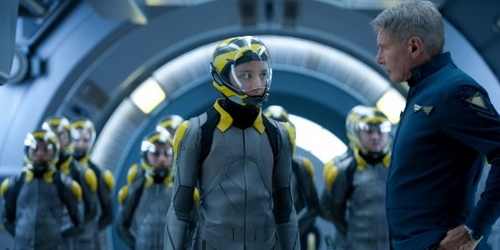
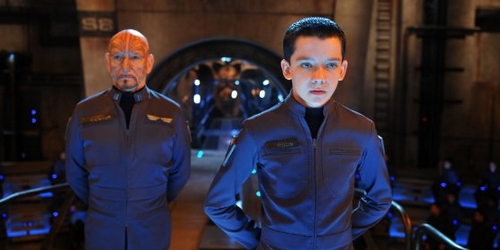
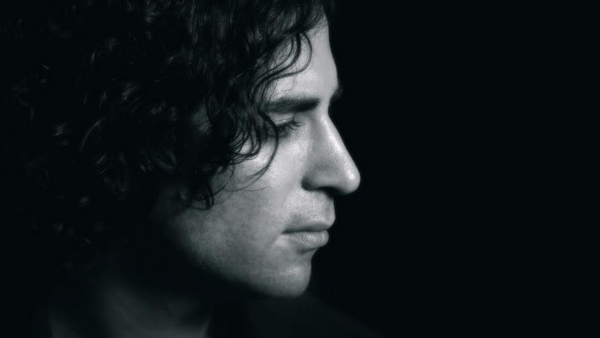
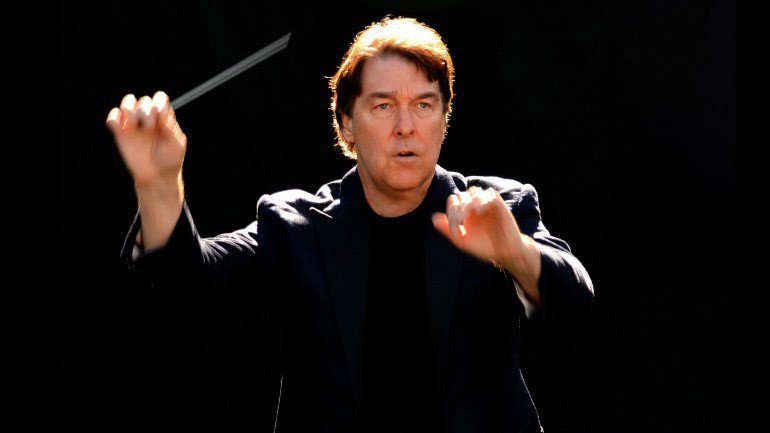
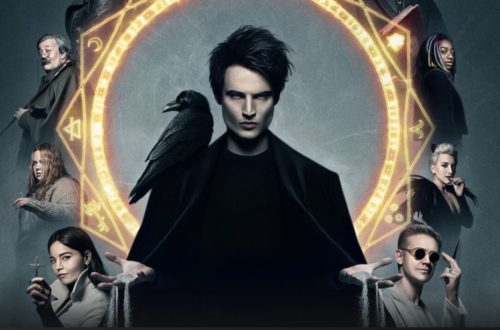
One Comment
Cindy
Steve Jablonsky is so awesome! I love all his pieces! There is nothing to say, he is just purely amazing with composing. 🙂